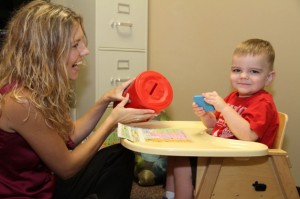What Happens In Speech Therapy?
What happens when your child visits a speech-language pathologist? What exactly will the SLP do? These are questions that many parents ask when their child has been recommended to start a speech therapy program. In order for you to set your expectations (and your child’s), here are the basics of what to expect from a speech therapy program. Of course, each course of therapy is tailored personally to your child’s particular speech disorder, or speech impairment. This should serve as a general guideline about the entire process.
What is an SLP?
Speech-language pathologists (SLPs), or speech therapists, are professionals educated in the study of human communication, its development, and its disorders. They hold at least a master’s degree and state certification in their field, and a certificate of clinical competency (CCC) from the American Speech-Language-Hearing Association (ASHA).
Speech-language pathologists work with people who cannot produce speech sounds or cannot produce them clearly; those with speech rhythm and fluency problems, such as articulation disorder or stuttering; people with voice disorders, such as inappropriate pitch or harsh voice; those with problems understanding and producing language; and those with cognitive communication impairments, such as attention, memory and problem solving disorders. They also work with people who have swallowing and/or chewing difficulties.
What Happens In Speech Therapy?
When your child is entered into speech-language therapy, an SLP will work with him or her in a few different ways; one-on-one, in a small group, or directly in a classroom to overcome difficulties involved with a specific speech disorder. No two speech therapies are exactly alike. While treatment is specifically designed to treat each individual differently, expect your SLP to utilize variety of strategies including:
- Language activities: These include playing and talking, using pictures, books, objects, or ongoing events to stimulate language development. The therapist may also model correct pronunciation and use repetition exercises to build speech and language skills.
- Articulation therapy: Articulation, or sound production, exercises involve having the therapist model correct sounds and syllables for your child, often during play activities. All exercises should be both age-appropriate and related to your child’s specific therapy needs. The SLP will physically show your child how to make certain sounds, such as the “r” or “t” sound, and may demonstrate how to move his tongue to produce specific sounds. Sometimes the use of a mirror is used in this activity.
- Oral-motor/feeding and swallowing therapy: If chewing or swallowing is a challenge, you can expect your SLP to use a variety of oral exercises including various tongue, lip, and jaw exercises to help strengthen the muscles of the mouth. The SLP also may work with different food textures and temperatures to increase your child’s oral awareness during eating and swallowing.
- Recommendations and follow up expectations: Your SLP will review his or her professional findings with you and will make recommendations for length and duration of speech therapy. If your SLP does not suggest homework, make sure to ask for tips, resources, and information about how to work with your child in between therapy sessions. Remember, as the parent, you are your child’s best teacher and the more you can do to assist your SLP in providing consistent therapy activities, the more likely you are to increase your child’s speech and language development.
The most important thing to remember about speech-language therapy is that early intervention is key! The earlier you can get your child started with speech therapy, the faster you both can achieve success!




